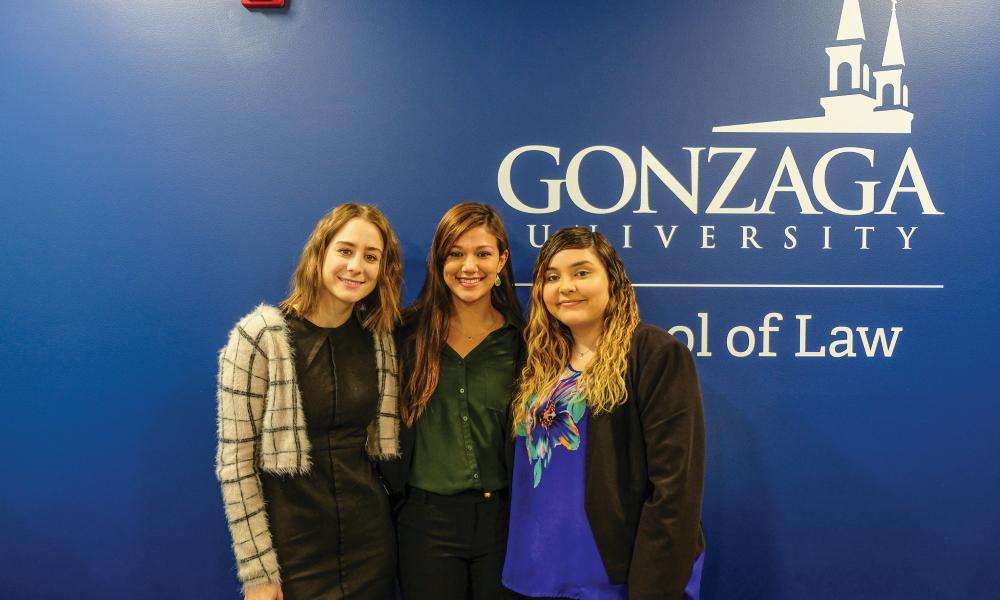
Collaboration for Immigrant Legal Assistance
Catholic Charities Eastern Washington and Gonzaga Law School Team up to Serve Immigrants in Eastern Washington
Catholic Charities Eastern Washington and Gonzaga Law School Team up to Serve Immigrants in Eastern Washington
In October, Gonzaga University School of Law, along with Catholic Charities Eastern Washington, announced the launch of a new joint initiative—an immigration law clinic at the law school. Since 1975, the Gonzaga Law School has hosted clinic-based education, which pairs students with an attorney in offering services to low-income clients. The clients are able to receive services at little to no cost, and the students gain valuable practical experience in the law. Over the decades, the GU legal clinic program has expanded to new fields of law. This addition of the Immigration Clinic is noteworthy for its partnership between Catholic Charities and the law school.
The director of the new clinic, Megan Case, has worked for Catholic Charities Eastern Washington since 2015 in its Immigration Services office. She said while Catholic Charities is able to help clients with a sliding scale payment system, the new joint clinic can serve those who cannot afford to pay anything. “We have a lot of immigrants in this community and in central Washington, so we will look to meet the needs in the region,” she said. As a joint project between the university and Catholic Charities, it expands the number of clients that can be served and provides valuable education for students. Case said the clinic wants “to serve as many clients as possible and teach as many students as possible.”
Rob McCann, president and CEO of Catholic Charities Eastern Washington, is enthusiastic about the new program. “All of us at Catholic Charities are extremely excited to create and launch this new joint venture with the GU Law School,” he said. “This innovative collaboration allows us to take our long standing immigration law program and leverage it with the breadth and depth of the Gonzaga Law School and will help us to serve exponentially more clients in coming years than we could have ever served on our own. With immigration being one of the sentinel issues of the Catholic Church in the U.S., it is especially urgent and important to create unique partnerships like this one that allow us to serve and advocate for our call to welcome the stranger.”
Four students worked in the clinic in the fall of 2019, but the program expands to a full complement of eight law students at the beginning of the term in January. Even before the expansion, the clinic was handling around 50 open cases, and, according to Case, “there is an emphasis on family unification. We do a lot of family-based petitions that include naturalization and getting a person’s status adjusted, and helping those outside the United States to join their families here.”
Already, some community members have expressed their concern that the clinic might encourage illegal immigration. Case was quick to point out “we are not encouraging anything that is unlawful; we are trying to help people within the law.”
Alejandra Lopez, a third-year law student and one of the initial members of the clinic, said she has long been drawn to immigration law. “I have known for a long time that I wanted to do immigration,” she said. “Both of my parents are immigrants; I am a first-generation American. My best friends in high school were undocumented. I have always been interested—the clinic has helped me learn much more. It has helped me build a foundation for my career.”
Her fellow clinic law student, Tsveta Ivanova Kelly, a second-year student, spoke about her personal experience.
“I am an immigrant myself,” Ivanova Kelly said. “I came to America first on a tourist visa. Then I came for studies. So I have had multiple international student visas. Now I am a permanent resident. I’ve been through the process myself. I am still going through the process. So to me, working in immigration law is giving back to my own community. Once you move, you are no longer 100% of anything, and I think the people who feel like they don’t belong become your community.”
Lopez and Ivanova Kelly said the immigrant community in Spokane and surrounding area is underserved. Both students are bilingual, but said the difficulty of immigration law is often the cultural and linguistic barriers. Lopez said, “even when we are bilingual, it can be difficult to speak ‘legal’ in another language even if you are fluent.”
Case spoke to the easiness of the collaboration, as the mission fits of both Catholic Charities and Gonzaga well. “This is a Jesuit university, so the humanistic values of the university and the mission of Catholic Charities are intertwined.” The chance to work with immigrants is also a chance for the students to embrace and live out the mission of Charities, the university and, in many ways, the teachings of the Church. “It really goes back to the heart of the Gospel,” Ivanova-Kelly said. “It is really special that we can express that through legal work.”
Lopez said that working in immigration law is uniquely rewarding: “Immigrants are always super thankful. In other parts of the law, that is not always the case.” Ivanova Kelly shared similar sentiments. Both students are working in the clinic again in the spring semester and are exploring a career in immigration law.
Megan Case and her students want everyone to know that the immigration clinic is here to help. “I would want people to know they can refer people here,” Case said. “We’d love the support of the community, especially the Catholic community.”



